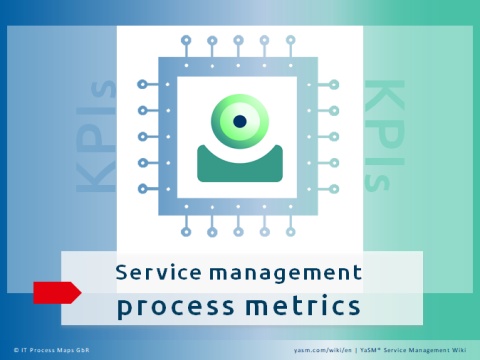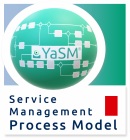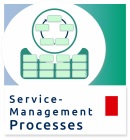Service Management Metrics
Process metrics (at times also referred to as 'key performance indicators' or 'KPIs') are used to assess if the service management processes are running according to expectations.
Proceed to: Process metrics for the service lifecycle processes | Process metrics for the supporting service management processes
Defining process metrics
Defining KPIs is above all about deciding what exactly is considered "successful" process execution. Once this is established, suitable metrics can be defined and subsequently measured. The process owners are then in a position to evaluate the quality of their processes, which in turn is the basis for process improvement.
The exact definitions of the metrics will vary depending on the nature of the service provider organization, so the key performance indicators contained in this wiki can only be suggestions.
Generally speaking, there is no shortage of recommendations for service management metrics. If further ideas are needed, the various service management frameworks like ITIL® [1], COBIT® [2] and USMBOK™ [3] may be consulted - but we advise using a focused set of metrics or KPIs that can be managed and acted upon in the long term.
A widely accepted principle holds that process metrics should be SMART:
- Specific
- Measurable
- Achievable
- Result-oriented
- Timely.
Quantitative and qualitative metrics
When developing sets of process KPIs, a distinction is often made between quantitative metrics and qualitative metrics (although the line between the two may at times be blurred):
- As the name suggests, quantitative metrics are typically straightforward measurements of volumes and frequencies (e.g. the number of service requests reported to 1st level support). Such metrics may not say much about the quality of the service request fulfillment process, but they can be useful for managing the resources required to fulfill service requests.
- Qualitative metrics have a more direct relationship to successful process execution. For example, if a service provider aims to resolve a high percentage of incidents directly in 1st level support, the 1st-line resolution rate would be a suitable qualitative metric.
Process metrics for the service lifecycle processes (LP)
- KPIs service strategy - LP1
- KPIs service design - LP2
- KPIs service build - LP3
- KPIs service operation - LP4
- KPIs service improvement (CSI) - LP5
Process metrics for the supporting processes (SP)
- KPIs SMS maintenance - SP1
- KPIs service portfolio management - SP2
- KPIs customer relationship management (CRM) - SP 3
- KPIs configuration management - SP4
- KPIs change assessment (change management) - SP5
- KPIs project management - SP6
- KPIs security management - SP7
- KPIs disaster prevention (service continuity management) SP8
- KPIs compliance management - SP9
- KPIs HR management - SP10
- KPIs supplier management - SP11
- KPIs financial management - SP12
Notes
[1] ITIL® is a registered trade mark of AXELOS Limited.
[2] COBIT® is a registered trademark of ISACA (Information Systems Audit and Control Association).
[3] USMBOK™ is a registered trade mark of Virtual Knowledge Solutions International Incorporated (VKSII).
By: Andrea Kempter ![]() and Stefan Kempter
and Stefan Kempter ![]() , IT Process Maps.
, IT Process Maps.
Defining process metrics › Quantitative and qualitative metrics › Process metrics for the service lifecycle processes (LP) › Process metrics for the supporting processes (SP)





